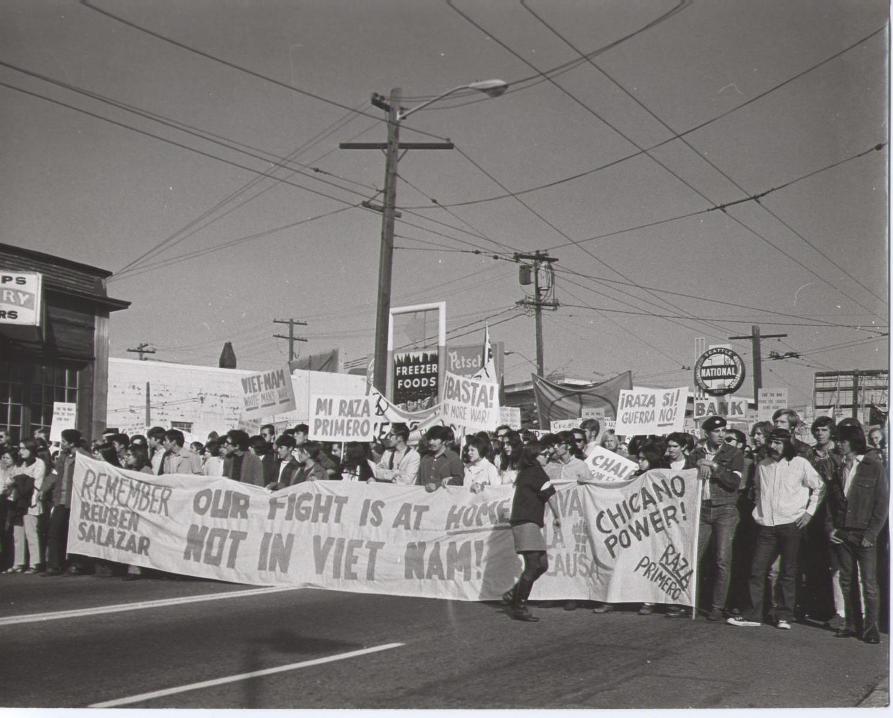 |
| Abelardo B. "Lalo" Delgado, Poet Laureate of Aztlan |
Some Not Too Objective Observations on the Chicano Movement and the Draft
It is a damn shame that to get the few points for a civil service job in the post office, a dozen Chicanos have to die, so that the thirteenth can return to get it
The Movement – The Draft
by Abelardo B. Delgado
Nothing can point to the determination of the Chicano youth to say enough to old abuses than to see them give the old draft board the finger.
Chicanos are still known for their ability to fight and die in Korea, Vietnam, Japan, Germany, and so, it comes as a surprise to many, the sudden turn of face.
A neat pile of medals is about all that was left of all Chicano contributions in those wars and those with medals, returning home, saw that those acts of heroism had not created one iota of social change and attitudes towered them, by the dominant society. For them, it was kind of late to do anything about it since they already had served; but for the youth today, it is a whole new ballgame and they're not playing.
I could burden the reader with statistic to point too, the disproportionate representation of Chicanos and Blacks in the Vietnam struggle, but I will not. You can, for yourself, do a better job by looking into your own community, by reading of so-and-so killed in action, who was from your barrio, or by merely looking into the colleges around the country, and seeing who is attending those colleges.
Even the peace movement, without realizing or wanting to, has produced a hardship on Chicanos, since the Anglo kid refused to go and goes to Canada or Sweden, or merely gets lost in the country, forcing draft boards to dig deeper into the Chicano communities, for quotas must be met -- one way or another.
I'm sure you have heard it said that even in the battle ground, a reverse discrimination does exist, by placing Chicanos on the front lines and protecting the “gueros” in the safe zones. This of course, is a damn serious charge to make against the armed forces, but it so happens that it is not I who make it from where I sit, but from many returning from there who know what they are saying.
I'm sure other discrepancies related to the Chicano's level of education upon entering the service do exist, limiting their choice and destining them to serve in less rewarding capacities.
I'm sure other discrepancies related to the Chicano's level of education upon entering the service do exist, limiting their choice and destining them to serve in less rewarding capacities.
Moratoriums and draft resistance movements within the Movement indicate the level of reluctance to serve in a gringo war which makes no sense, and to defend the country from the threat of Communism when a defense needs to be initiated right at home. A defense against poverty, disease, homelessness, ignorance, bigotry, and apathy is needed.
Awareness of these deficiencies is more dangerous to the internal security of the U.S.A. Than the Viet Cong could ever hope to be. The fight is here in the barrio and in the campos, and this fight is worth dying for, and no other will do for our Chicano youth.
In the Korean conflict, I lost my friend; more than a friend, a true carnal – Enrique (Rica) Salcido. I cannot adjust my mind to accept such unnecessary loss – off from basic training and into death, and why? As in the case of thousands like Salcido, not one more door opens for bettering ourselves.
It is a damn shame that to get the few points for a civil service job in the post office, a dozen Chicanos have to die, so that the thirteenth can return to get it.
For long, the Chicanos have viewed the Army, or services in general, as a possible route to escape the misery of the barrio, but new doors are being created by the movement in which such a high price does not continue to be paid for our economic and educational freedom.
It is ironic that the early birth of the Movement was in the minds of returnees from World War II. They foresaw a brighter future for Chicanos now that the battle had been won, and now, Vietnam. Peace and prosperity promised to Chicanos continues to hang like a carrot to make us fight in the “punta” of a rifle. “Hell no, we won't go!” goes double for Chicanos.
Other parts of this series:
Part IV Goals









No comments:
Post a Comment